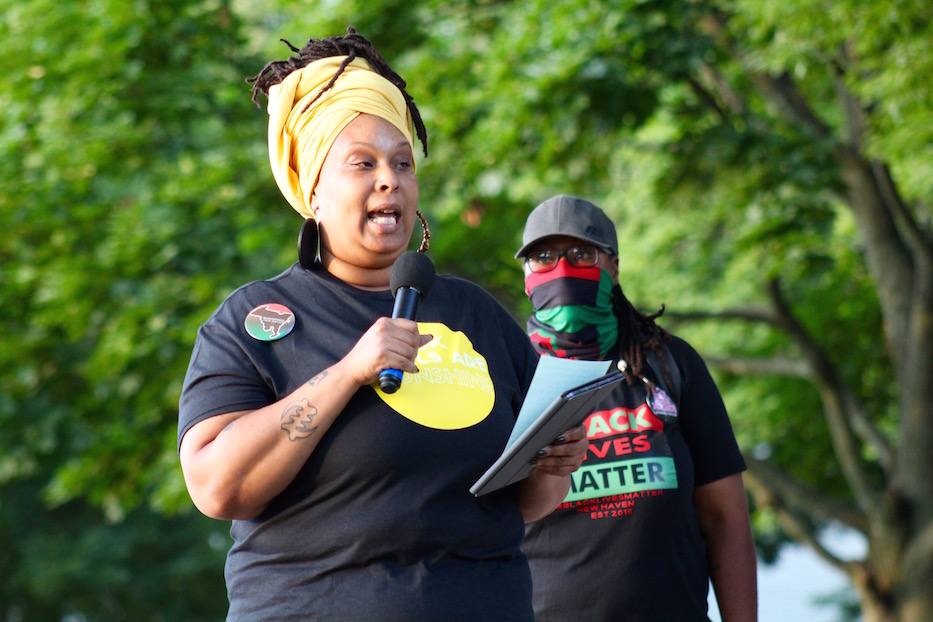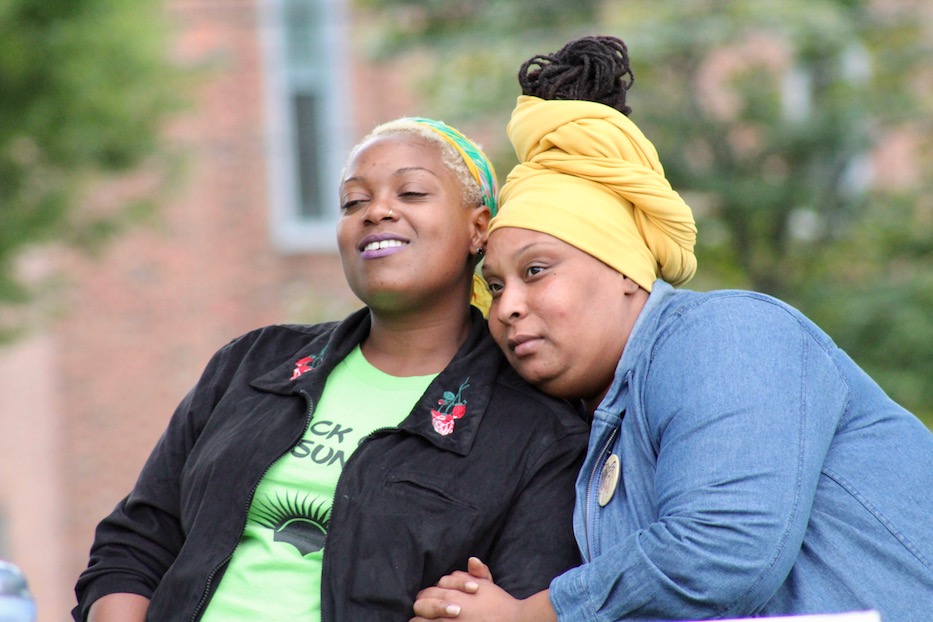

| At a rally addressing gun violence in July, Sun Queen spoke on behalf of Black Lives Matter New Haven. "We can't do it alone," she said. "We are only five people. It takes us. It takes you. It takes community. It takes all of us. This is not a fight for just one person. It's your responsibility to get out and do the things that you need to do in the community, to do the things that you need to do in your home." |
This is part of a new series of interviews with New Haven artists about the U.S. Census. In installments, artists answer the same 12 questions about the Census, which determines the amount of federal aid allocated to New Haven.
Sun Queen did one thing right away when a notice about the 2020 Census arrived in her mailbox. She filled it out. Then she made sure her mother had done the same thing.
Sun Queen is a poet, author, activist and co-founder of Black Lives Matter New Haven. She also runs the Black Girls Are Sunshine campaign. On Thursday, she was also celebrating another milestone: the fifth anniversary of Black Lives Matter New Haven, which happened to fall on Black Women’s Equal Pay Day.
“It feels amazing,” she said. “It’s an accomplishment. You have queer Black women on the front lines, where many people judge and have so much to say. We have not wavered. We have been out here, unapologetically, fighting. Five years is a long time. We’ve been threatened, and harassed, and there’s all this negative energy being thrown. I’m looking forward to five, and 10, and 25 more years, because it’s a long journey.”
She is also one of New Haven’s biggest advocates of the census. In a recent interview, she recalled taking it as soon as she heard it was available. She has booked a census representative at the Black Lives Matter New Haven back-to-school drive planned for later this month, on August 22. Now she's trying to get the word out, in a race with time.
The U.S. Census Bureau has announced that it will stop counting respondents on Sept. 30, a month earlier than previously planned. Held every 10 years and mandated by the U.S. Constitution, the census is intended to count every person in the country and collect data for the proper allocation of federal funds and drawing of legislative districts.
It also determines how much money each state receives from the federal government. In other words, it directly impacts New Haven’s access to Medicaid, Medicare, Head Start early childhood education, Supplemental Nutrition Assistance Program (SNAP) food benefits, and other essential federal benefits programs.
New Haven leaves roughly $2,800 on the table for every person not counted. In 2010, some 40,000 New Haveners were left out.
An edited version of the interview is below.

| Ashleigh Huckabey and Sun Queen at a fundraiser for the CT Bail Fund in September 2019. Lucy Gellman File Photo. |
Have you completed the census?
Absolutely! Of course. I completed it; I made sure everyone around me took the time out to complete it. I was also supposed to work [as a census enumerator], but then everything around COVID-19 happened and I just got crazy busy and wasn’t able to get my fingerprints done.
I really did want to actually work for the census this year. I also do the PIT, the point-in-time for homeless people too. So I always tend to be involved around things that shape our everyday life. You know, I wanna count.
How do you identify personally? How do you identify on the census?
My parents are Black, and so … I’m one of those people that it’s like, I’m Black, on top of being Black, on top of being Black, on top of being Black. So yeah, I was able to answer.
Did you find any challenges completing it?
Not really. The only thing that stood out to me is I received mine, and my mom received hers too. Her mail is forwarded here; she’s with me for the moment. So I was like, “wait, what do I do?” It did have a question where I was able to answer it, and pretty much describe what worked for my current living situation. I made sure my mother completed hers too, because it’s only temporary.
When people throw their hands up saying, "I don’t want to do it,” it’s either that they don’t understand or they really don’t care. It’s definitely important to explain it. We see the same thing with voter numbers. They can be up sometimes, and then they might be down, because people think that votes don’t matter.
I think a way that I would explain it for people to be able to receive it and connect is just that the census is one of the things that will eventually adjust our lives. We have to be counted for. If you care about the allocation of money, if you care about community resources—mental health, education, all of these things that you need to have access and an equitable life—the Census contributes to that. The data affects our lives, our resources, and the community. If you care about those things, then you want to be counted for.
Will this be the first census you complete?
No. Even when I was younger, residing with my mom, I completed it with her anyway. You gotta make sure it gets done.
If not, what was your first experience with it?
I think when you’re taking it, it may seem like it’s a small, minute thing. But anything that I’m doing to basically make my voice heard and say “Hey, I matter,” that makes me feel good.
You’re taking a couple minutes out of your day to be a part of making change and progress within your city. And that’s the thing. We have so many people who don’t like protesting, marching. The front lines are not for them. The census is one of the things that you can do to try to make a difference.
There are so many other things that you can do to make change. So many different levels. I think of my mom. She had me work at the polls—she still works at the polls. And when the census comes, we always did those things together to make sure we’re counted for.
When did you first learn about the census?
I don’t know if I would necessarily say school—like not necessarily in the classroom. I know I was in school at the time, but I would say fliers around the community and commercials and things like that. It may have been the library too—the library always has tons of information.
What do you think people in your family or immediate community think of the census? It sounds like you have a very census-positive household, which I love.
In our family, we matter to each other. And when you think about the census, you have to correlate that with assistance. The money—whether it’s SNAP, or energy assistance, or all the different programs and resources—all those things correlate with the census. So we want to make sure that our families and our community can continue to have the proper money that’s needed to continue to run these programs.
It’s not only someone in one family receiving this assistance. The community is receiving assistance. It’s our village as a whole. We need these things to help us thrive out here. We have to make sure that our communities have the proper resources and access that we need to live.
Do you think there is a distrust around the census and the government collecting information at large?
Yes! The village, we’re all Black and Brown lives. I definitely get it.
Listen. [In my job] I have to take extra minutes to get people to enroll in medical coverage, because they’re giving me their assets and income, and they don’t want to give the state their information. Even though this program helps them, they’re like, “Nah, you don’t need all this about me.” So I definitely get it.
When you have people who are dealing with child support, law enforcement, who don't want to be found, or whatever the situation is—they feel like once their name goes into this database, once you give up this information, then someone who is looking for you will be able to come and find you. These feelings and thoughts are real. I can’t say these aren’t valid for people.
What are some myths you heard growing up about the census?
I guess that one of the things that I heard growing up is: You, completing the Census, it doesn’t matter. That we’re not gonna get extra money, that the money isn’t going to go to the resources that we need. That they just want your information.
How do you think the census could be improved?
You know, it's [plays a] a small part in shifting our social and economic status. I wish that the census was also counting things like gentrification. We need resources. We need resources to thrive. We just have to play our part and complete this document, and make sure that our community is being properly funded.
I think with any data that’s collected like this, I’m often worried about whether we’re truly being counted in the manner which the census is supposed to. I get really worried—like, is the information accurate, or are you collecting the part that you want and leaving the other data and numbers out there?
What would you like to be included in the next census?
Maybe a question asking, like, how we feel some of the money should be allocated. Like, to what specific resources and how much?
There’s money out there. It’s like CARES Act funding. The more you want to keep denying people resources, there’s more there is unemployment, that’s when crime and violence rise.
What would you tell people who are skeptical about filling out the census?
Well, for one, we will have a 2020 Census rep at the Black Lives Matter New Haven back to school drive. For the people who haven’t done it yet, I definitely would tell them that the census matters because you matter. The census is vital to determining our resources, our programs, and the access that we have. It’s just important to use our voices. Even though we’re completing a form on paper or online, we’re still taking the time and using that energy to say: Hey. Count me in. I matter.
If you want to bring about change and make sure you and your family, your loved ones, your village, your community have these necessary resources and that they get distributed as fairly as possible, make sure you count. People probably will give that pushback, like “oh, it’s not gonna matter.” But it does matter. And that’s not the end all, be all. There are so many levels to bringing about change, and this is one of them.
To take the 2020 Census online, click here. To find out more about Black Lives Matter New Haven's fifth annual back-to-school drive, click here. To read Sun Queen's work or learn about her most recent book, click here. She also runs the campaign Black Girls Are Sunshine.

